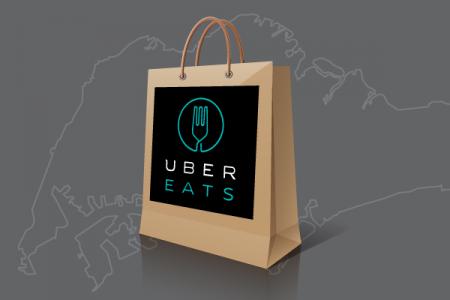Food delivery app UberEats set to launch in Singapore
Food delivery services to have new competition in Uber spin-off
Online transportation network Uber is moving into food delivery in Singapore.
The New Paper understands that restaurants here have already been approached by the service, which is called UberEats.
When contacted, Uber would say only that they are "pleased that word is sure spreading fast about UberEats" and that "details will be announced soon".
It will be the latest addition to a market that already has well-known food delivery services Foodpanda and Deliveroo. (See report on right.)
TNP understands that UberEats may be launched within the next month and that at least 10 food and beverage outlets have been approached, some as early as a month ago.
Two said they have accepted a deal, one of whom said UberEats had offered it an "exclusive" contract. Of the others TNP spoke to, one has rejected the deal and the rest are considering their offers.
UberEats operates in 13 cities globally, including Los Angeles, Paris and Melbourne.
First launched in 2014 as UberFresh, it was an option integrated with the Uber transport app before Uber launched its standalone UberEats app in March last year in five cities. Other cities are "just around the corner".
But last month, UberEats New York killed its "instant" option, which promised to deliver preselected meals in 10 minutes, as it had wanted to "narrow its focus".
On UberEats' website for delivery crew sign-ups, an option for Singapore in the drop-down location field already exists.
Transportation methods differ in each city. London, for example, allows scooters and bicycles to be used, but driving is the only transportation method available to delivery crew here.
Foodpanda's delivery charges vary by restaurant while Deliveroo charges a $3 flat delivery charge for orders above $25, and another $5 surcharge for orders below $25.
INTERNATIONAL RATES
Although specific details of UberEats Singapore are unknown, UberEats charges a flat delivery fee of about US$5 (S$6.80) in US cities and A$5 (S$5) in Melbourne, Australia.
In the US, after a customer places an order, UberEats sends it to the restaurant and gives the customer an estimated delivery time.
When the order is almost ready, Uber locates a driver in the vicinity of the restaurant and asks if he would like to deliver the item.
If there are multiple orders from the same place at around the same time, the orders will be combined in a single trip so the driver can earn multiple delivery fees.
The delivery fee is shared between Uber and the driver. Uber charges the restaurant a fee for every order placed through UberEats.
Food delivery market growing
While there is no data on how much the Singapore food delivery market is worth, experts agree it is growing.
In March, Foodpanda's managing director Emma Heap revealed that last year saw a 400 per cent growth in revenue over the year before, reported The Straits Times.
Four months after it launched here in November, London-based start-up Deliveroo saw its fleet grow from five delivery riders to 550.
Other players in the food delivery market include hawker.today, which delivers hawker food, and The Foodist, which curates tasting boxes that start from $15.
"The food delivery industry is growing as consumers today are time-stressed and opt for convenience, from dining to online shopping," said Adjunct Associate Professor Lynda Wee from Nanyang Technological University's Nanyang Business School.
On whether UberEats can compete with existing competitors, Dr Wee said: "If UberEats is able to meet diners' demands in different and better ways, why not?
"Take the example of eyewear retail shops. There may be many optical shops, but this does not mean that the market is saturated. If it is saturated, how come (optical shop) Owndays can grow?"
WARNING
But some warn against the sustainability of such services.
Associate Professor Ang Swee Hoon from National University of Singapore Business School said food delivery services must receive large orders to enjoy economies of scale.
She added: "The convenience that food delivery services offer have to far outweigh the 'inconvenience' of going out to buy food yourself.
"This may be difficult given that foodcourts are so accessible nowadays and are probably less expensive than food delivery."
Experts are also divided on whether the "Uber brand" will have an effect on UberEats.
Food and private car-hire are two different products altogether and consumers will not necessarily flock to UberEats just because Uber is well-known, said Prof Ang.
She said that UberEats has to differentiate itself from its competitors to break through the competitive clutter.
But Dr Wee said that "brand recognition" may help UberEats.
She said: "If we (consumers) have a good experience with Uber, we will transfer the positive feelings.
"Uber is perceived as innovative by being a game changer in the taxi business. Hence, we expect the same for UberEats."
Get The New Paper on your phone with the free TNP app. Download from the Apple App Store or Google Play Store now


